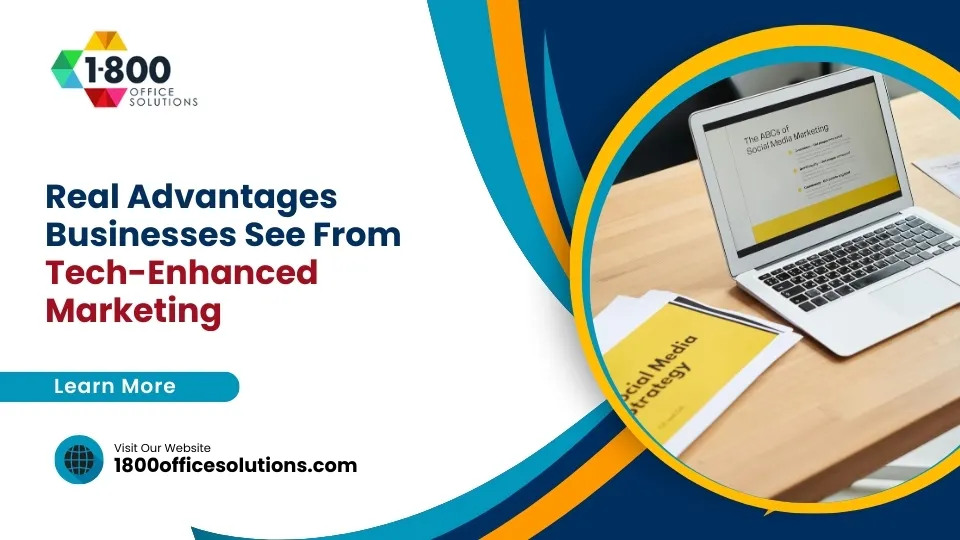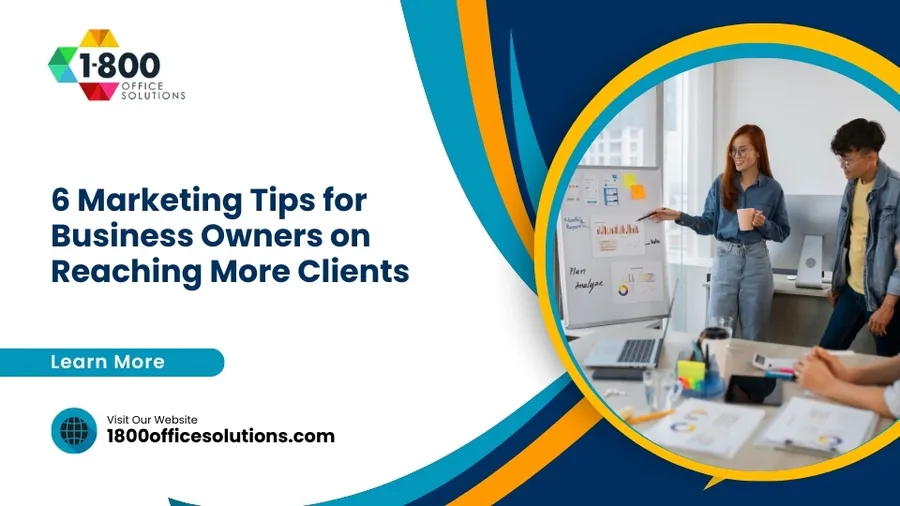8 Smart Strategies for Improving Your Search Engine Ranking
When it comes to making your website visible in a sea of billions, understanding 8 ways to improve your search engine ranking is crucial. Here’s a quick summary for those who need a fast answer:
- Improve User Experience – Streamline your site for easy navigation.
- Optimize for Mobile – Ensure seamless access on smartphones.
- Focus on a Niche – Target specific, less competitive keywords.
- Boost Page Speed – Fast-loading pages are favored by search engines.
- Create Linkable Assets – Develop content that others want to cite.
- Target High-Intent Keywords – Use keywords that drive conversions.
- Leverage SERP Features – Use sitelinks and featured snippets.
- Analyze SEO Performance – Use tools like Google Analytics for insights.
SEO, or Search Engine Optimization, is about making your site more appealing to search engines. This is important because most web experiences begin with a search. Ranking higher means more people will find your site first, bringing more traffic and potential business.
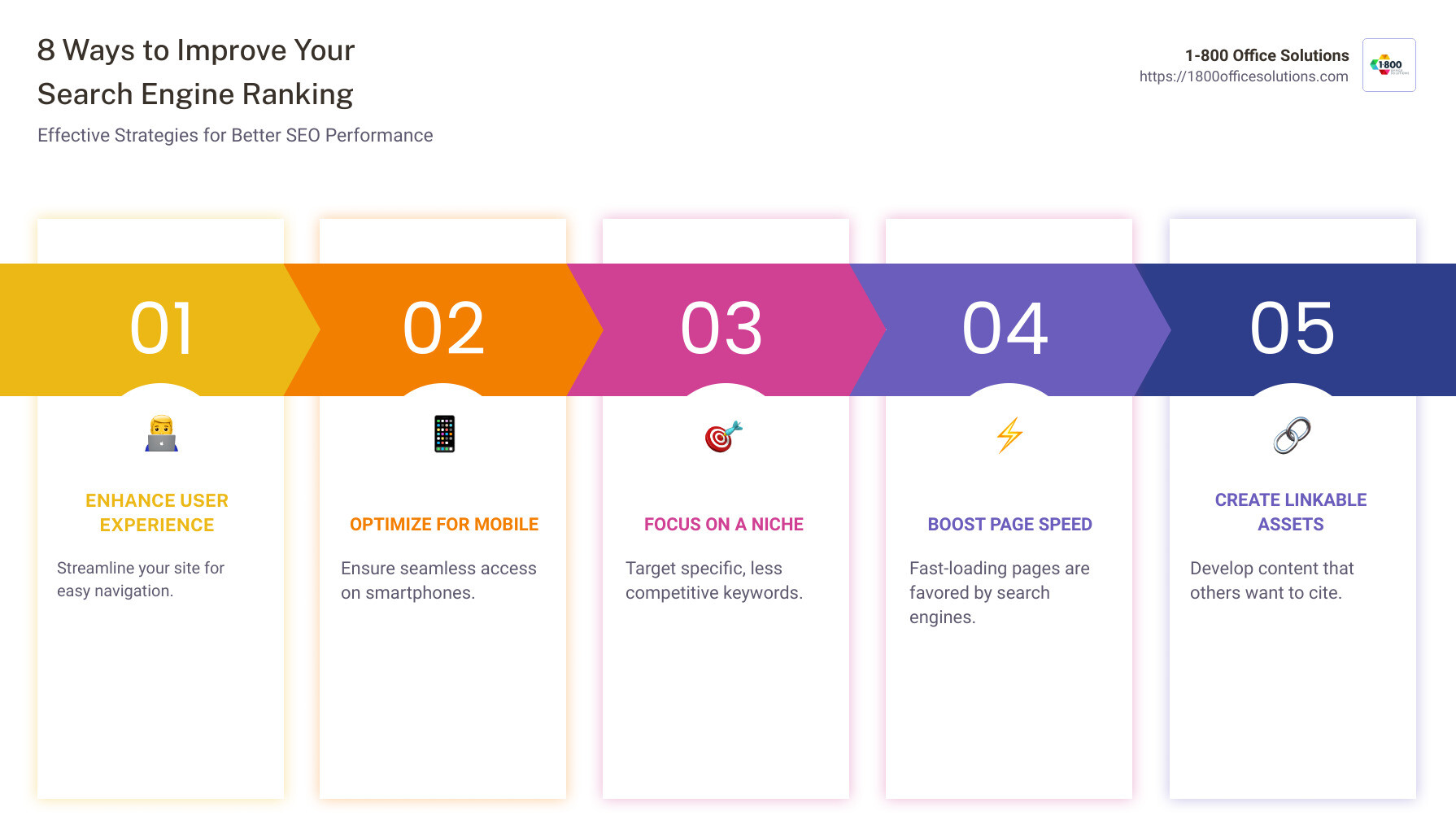
Write for People, Not Robots
In SEO (Search Engine Optimization), it’s easy to get caught up in the technicalities and forget the most crucial element: the people. Search engines are becoming increasingly adept at understanding human behavior, so focusing on human-centered SEO is key.
Human-Centered SEO
Instead of writing content that tries to “trick” search engines, aim to create content that genuinely interests and benefits your audience. Google and other search engines prioritize content that satisfies user queries and provides a great experience. This means your content should be clear, engaging, and relevant to your audience’s needs.
Long-Tail Keywords
One effective way to connect with your audience is by using long-tail keywords. These are longer, more specific keyword phrases that visitors are more likely to use when they’re closer to making a purchase or finding the information they need.
For example, instead of targeting a broad keyword like “office supplies,” you might focus on a long-tail keyword like “eco-friendly office supplies for small businesses.” Long-tail keywords often have less competition, making it easier for your content to rank higher in search results and attract the right audience.
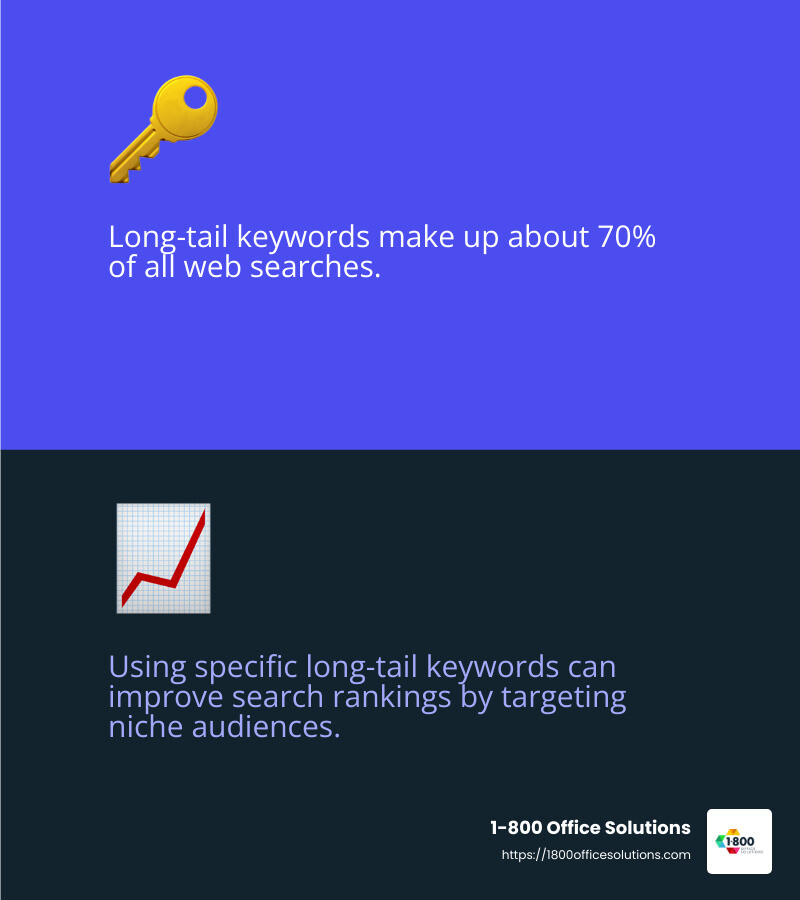
Understanding User Intent
Understanding user intent is crucial for crafting content that meets your audience’s needs. User intent refers to what the searcher is actually looking for when they type a query into a search engine. Are they looking for information, trying to make a purchase, or seeking a specific website?
By aligning your content with user intent, you increase the likelihood of satisfying your audience and improving your search engine rankings. For instance, if someone searches for “how to set up a home office,” they likely want a step-by-step guide, not a sales page.
Incorporating these strategies into your content creation process not only helps improve your search engine ranking but also ensures your audience finds value in what you offer. When you write for people, not robots, you build trust and authority, which ultimately leads to better engagement and conversions.
Next, let’s dive into how to effectively research and use keywords to improve your SEO efforts.
Research and Use Keywords Effectively
Finding the right keywords is like finding a map to guide potential customers to your website. It’s one of the 8 ways to improve your search engine ranking effectively. Here’s how you can master this essential skill.
Keyword Research
Start by identifying keywords that are relevant to your business. Use tools like Google Keyword Planner or Moz to find terms people use when searching for your products or services. Focus on keywords with a good balance between search volume and competition.
Example: If you own an office supply store, instead of just “office supplies,” think about what your customers might be searching for specifically, like “ergonomic office chairs.”
Commercial vs. Informational Keywords
Understanding the difference between commercial and informational keywords can significantly impact your SEO strategy.
- Commercial Keywords: These are terms used by people ready to make a purchase. Examples include “buy office printer” or “office chairs for sale.” Targeting these can lead to higher conversion rates.
- Informational Keywords: These are used by those seeking knowledge, such as “how to organize a home office.” While they might not lead to immediate sales, they can help build trust and authority.
Focusing on a mix of both can help attract a wider audience and guide them through the buying journey.
Google Trends
Keep an eye on Google Trends to stay updated on what people are searching for in your industry. This free tool shows the popularity of specific search terms over time, helping you spot emerging trends and seasonal spikes.
Tip: Use Google Trends to compare the popularity of similar keywords and choose the ones with the highest potential impact for your business.
By effectively researching and using keywords, you can ensure your content aligns with what your audience is searching for, ultimately improving your search engine ranking.
Next, we’ll explore how to optimize your website content to make it more appealing to both users and search engines.
Optimize Your Website Content
Optimizing your website content is a crucial step in the 8 ways to improve your search engine ranking. Let’s break down the key elements: content quality, readability, and meta tags.
Content Quality
High-quality content is the heart of successful SEO. It’s not just about stuffing keywords into your pages; it’s about providing valuable, informative, and engaging content that meets your audience’s needs.
Think about what your customers are searching for and aim to answer their questions or solve their problems. Use real-life examples, case studies, or expert insights to add depth and credibility to your content. This approach not only helps in ranking higher but also builds trust with your visitors.
Readability
Readability plays a significant role in how users interact with your site. If your content is easy to read and understand, visitors are more likely to stay longer and explore further. This can lead to lower bounce rates and higher engagement, both of which are positive signals to search engines.
Here are some tips to improve readability:
- Use short sentences and paragraphs.
- Break up text with headers, bullet points, and lists.
- Use simple vocabulary that’s easy for an 8th grader to understand.
- Include visuals like images or infographics to make complex information more digestible.
Meta Tags
Meta tags are snippets of text that describe a page’s content. They don’t appear on the page itself but in the page’s code. These tags are essential for SEO because they help search engines understand what your page is about.
- Title Tags: This is the title of your page that appears in search engine results. Make sure it includes your primary keyword and is compelling enough to encourage clicks.
- Meta Descriptions: This short paragraph appears under your title tag in search results. It should provide a concise summary of the page and include relevant keywords. Think of it as a mini-ad for your content.
- Header Tags (H1, H2, etc.): These help structure your content and signal its hierarchy to search engines. Use them to organize your content logically and include keywords where appropriate.
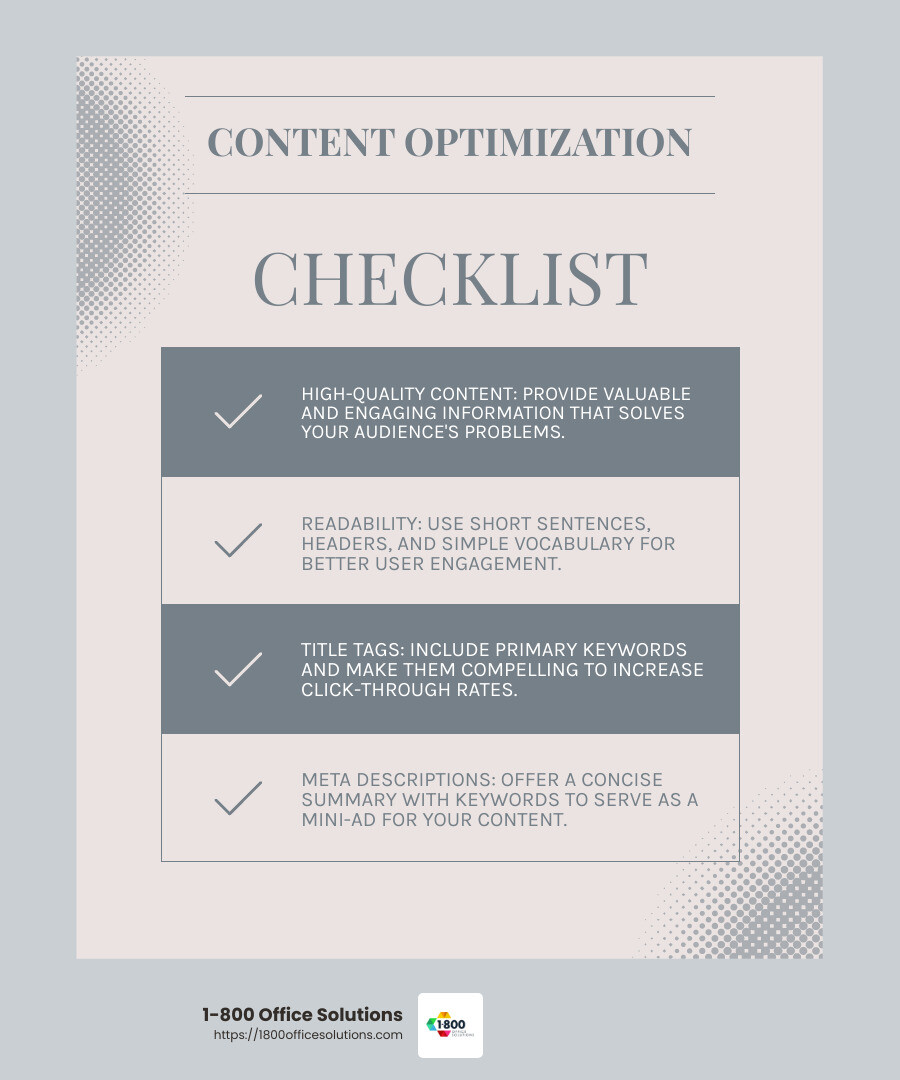
By focusing on these areas, you can create content that’s not only optimized for search engines but also engaging and useful for your audience. Next, we’ll dive into technical aspects like improving page load speed and mobile-friendliness to further improve your website’s performance.
Improve Technical SEO
When it comes to the 8 ways to improve your search engine ranking, enhancing your technical SEO is a must. Let’s explore how page load speed, mobile-friendliness, and alt text for images can make a big difference.
Page Load Speed
Page load speed is crucial. 53% of people will leave a page if it takes more than 3-4 seconds to load. This not only affects user experience but also your search engine rankings.
Fast-loading pages are favored by search engines like Google. To get started, use tools like Google PageSpeed Insights to check your site’s speed. Consider compressing images, reducing the size of files, and removing unnecessary scripts to speed things up.
Mobile-Friendliness
With more people using mobile devices to search the web, mobile-friendliness is essential. Google uses mobile-first indexing, meaning it primarily uses the mobile version of a site for ranking. If your site isn’t mobile-friendly, it could hurt your rankings.
Ensure your website is responsive, meaning it adjusts to fit any screen size. Keep navigation simple and buttons easy to tap. Test your site on different devices to ensure a smooth experience for all users.
Alt Text for Images
Alt text is important for both accessibility and SEO. Search engines can’t “see” images; they rely on alt text to understand them.
When adding images, include descriptive alt text that explains what the image is about. Use relevant keywords where appropriate, but keep it natural. This not only helps search engines index your images but also assists visually impaired users who rely on screen readers.
By focusing on these technical aspects, you can boost your website’s performance and improve your search engine ranking. Up next, we’ll discuss how leveraging social media and local SEO can further improve your visibility online.
Leverage Social Media and Local SEO
When exploring the 8 ways to improve your search engine ranking, don’t overlook the power of social media and local SEO. These tools can significantly boost your online presence and attract more visitors to your site.
Social Media Optimization
Social media platforms are not just for connecting with friends. They can be a powerful tool for improving your search engine ranking. While social media links don’t directly impact your ranking, a strong presence can increase visibility and engagement, which indirectly boosts SEO.
Optimize your social media profiles by including relevant keywords in your bio and posts. Use industry-specific hashtags to increase findability. Individual posts on platforms like Twitter are indexed by Google, so using keywords can help these posts appear in search results.
Creating valuable content that your audience will share is key. Use “power words” in your messaging to evoke emotions and encourage sharing. For example, words like “amazing,” “exclusive,” and “free” can prompt action. Also, don’t forget to include a clear call to action, like “share this post” or “click this link.”
Local Searches
Local SEO is crucial, especially for businesses with a physical location. 72% of consumers who search for local information on their smartphones visit a store within 5 miles. This means optimizing for local searches can drive more foot traffic to your business.
Include local keywords in your content, such as “pizza shop in Los Angeles.” Create location-specific pages on your website if you have multiple branches. Also, consider adding locally focused content like blog posts about community events or partnerships.
Google My Business
A Google My Business profile is essential for local visibility. It helps your business show up in local search results and on Google Maps. Even businesses without a storefront can benefit from a Google My Business listing.
Ensure your business information is comprehensive, consistent, and up-to-date. Encourage customers to leave online reviews, as positive reviews can improve your credibility and improve rankings.
By leveraging social media and local SEO, you can improve your online presence and connect with more potential customers. Next, we’ll dive into building quality backlinks and how they contribute to your search engine ranking.
Build Quality Backlinks
Building quality backlinks is crucial when considering the 8 ways to improve your search engine ranking. Backlinks are like votes of confidence from other websites, signaling to search engines that your content is valuable and trustworthy.
Backlink Strategies
Let’s start with effective strategies for acquiring high-quality backlinks. One proven method is creating linkable assets—content that is so valuable or unique that others naturally want to link to it. This could be a detailed guide, an infographic, or original research.
For instance, a study on voice search might attract more links than a general article about Google Search Console. This is because the study provides specific data that journalists and bloggers can easily reference.
Another strategy is guest blogging on reputable sites in your industry. This not only helps you gain exposure but also earns you backlinks from authoritative sources.
Finally, consider the Backlink Gap technique. By analyzing the backlinks of your competitors, you can identify sites that link to them but not to you. Reach out to these sites and offer your content as a valuable resource.
Internal and External Links
Don’t underestimate the power of internal linking. These links connect different pages on your website, helping search engines understand your site’s structure and hierarchy. They also guide users to related content, keeping them engaged longer.
For example, if you have a blog post about “office productivity tips,” you can link to another post about “time management strategies.” This not only improves user experience but also spreads link equity across your site.
External links are equally important. They show that you’re referencing credible sources, which can improve your own credibility. Just ensure that the sites you link to are trustworthy and relevant to your content.
Link Credibility
Not all backlinks are created equal. Link credibility is key to improving your search engine ranking. Search engines prioritize links from authoritative sites over those from lesser-known or spammy sites.
A backlink from a well-respected industry publication carries more weight than one from a random blog. Therefore, focus on building relationships with reputable websites and earning links from them.
Quality trumps quantity. A few high-quality backlinks can be more beneficial than numerous low-quality ones.
By adopting these backlink strategies and focusing on link credibility, you can significantly improve your site’s authority and improve your search engine ranking. Next, we’ll explore how to monitor and analyze your SEO performance to ensure ongoing success.
Monitor and Analyze SEO Performance
Once you’ve implemented strategies to improve your search engine ranking, it’s crucial to keep an eye on how things are going. This is where Google Analytics and Google Search Console come into play. These tools help you see what’s working and what needs tweaking.
Google Analytics
Google Analytics is like a digital magnifying glass for your website. It shows you how many people visit your site, where they come from, and what they do once they get there.
For example, if you notice a lot of visitors dropping off at a certain page, it might be time to improve that page’s content or design.
Also, pay attention to metrics like bounce rate and average session duration. A high bounce rate might indicate that visitors aren’t finding what they’re looking for, while a longer session duration usually means they’re engaged with your content.
Google Search Console
Google Search Console is another essential tool. It helps you understand how Google views your site and provides insights into your search performance. You can see which keywords bring people to your site and how your site ranks for those keywords.
One of the most valuable features is the Index Coverage Report. This report shows any issues that might prevent your pages from being indexed by Google. Fixing these issues can improve your visibility in search results.
SEO Tools
Beyond Google Analytics and Search Console, there are other SEO tools that can offer deeper insights. Tools like SEMrush or Ahrefs can help you track your keyword rankings, analyze your competitors, and find opportunities for improvement.
For instance, if you notice a competitor ranking higher for a keyword you want to target, these tools can show you what they’re doing differently. Maybe they have more backlinks, or perhaps their content is more comprehensive.
By using these tools, you can make data-driven decisions to improve your SEO strategy.
Monitoring and analyzing your SEO performance is not a one-time task. Regularly check your analytics and reports to ensure your strategies are effective. This way, you can make informed adjustments and continue improving your search engine ranking.
Next, let’s explore some frequently asked questions about improving search engine ranking.
Frequently Asked Questions about Improving Search Engine Ranking
What are long-tail keywords?
Long-tail keywords are specific phrases that people use when searching for something online. Unlike short, broad keywords, long-tail keywords usually consist of three or more words and target a niche audience. For example, instead of using “shoes,” a long-tail keyword might be “comfortable running shoes for women.”
These keywords are crucial because they make up about 80% of all searches. They help you attract visitors who are more likely to be interested in your content or products. By focusing on long-tail keywords, you can improve your chances of ranking higher in search results and reaching the right audience.
How does page load speed affect SEO?
Page load speed is a critical factor for SEO. If your website takes too long to load, visitors might leave before even seeing your content. Google considers this when ranking websites because it affects user experience.
According to a study by Neil Patel, pages that rank at the top of Google’s first page tend to load faster than those lower down. To improve your page load speed, consider compressing images, reducing file sizes, and using a reliable hosting service. A faster website not only helps with SEO but also keeps your visitors happy and engaged.
Why is local SEO important?
Local SEO is essential for businesses that want to attract customers in their specific geographic area. It helps your website show up in local search results, making it easier for nearby customers to find you.
For example, if someone searches for “coffee shop near me,” local SEO ensures your business appears if it’s relevant to the searcher’s location. Statistics show that 76% of people who search for something nearby visit a business within a day, and 28% of those searches result in a purchase.
To boost your local SEO, make sure your business information is up-to-date on Google My Business, and include local keywords in your content. This strategy increases your visibility and can significantly impact your sales.
Now that we’ve addressed some common questions, let’s wrap up and discuss how patience and continuous improvement are key to SEO success.
Conclusion
Improving your search engine ranking is not an overnight task. It requires patience and a commitment to continuous improvement. SEO is a journey, not a destination. As search algorithms evolve and user behaviors change, it’s crucial to stay updated and adapt your strategies.
Being patient means understanding that your efforts might take time to show results. You won’t see your website jump to the top of search results immediately. Instead, focus on consistently applying best practices and monitoring your progress.
Continuous improvement is about learning from your SEO performance. Use tools like Google Analytics and Google Search Console to analyze what works and what doesn’t. Regularly update your content, optimize your keywords, and refine your strategies based on data insights. This proactive approach ensures you remain competitive and relevant.
At 1-800 Office Solutions, we understand the importance of staying ahead in the digital landscape. Our comprehensive office solutions can help you implement these strategies effectively. By focusing on SEO, you can improve your online presence, attract more visitors, and ultimately grow your business.
The key to success in SEO is to stay patient, keep learning, and never stop improving. With dedication and the right strategies, you’ll see your search engine rankings rise over time.





